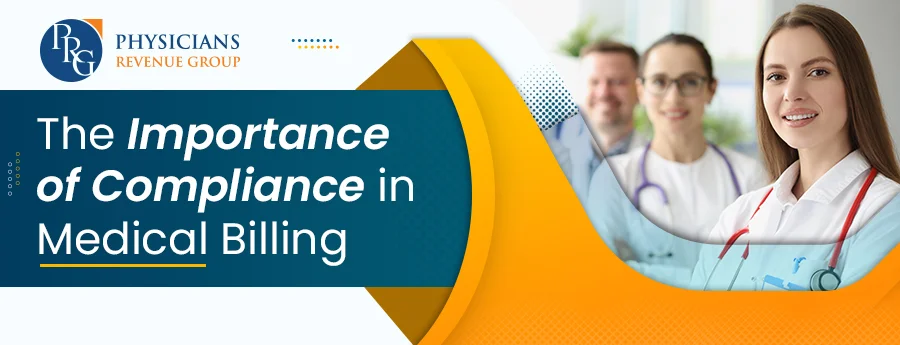
Email: info@prgmd.com | Call: +1 (630) 242-6474
Business hours: 9:00 to 5:00 | Monday to Friday
Email: info@prgmd.com | Call: +1 (630) 242-6474
Business hours: 9:00 to 5:00 | Monday to Friday

Table of Contents
ToggleCompliance in medical billing is the name given to tasks that prevent fraud, abuse, and waste inside a healthcare entity. In layperson’s terms, a compliance program is the ongoing and active process for ensuring ethical, legal, and professional standards are met in addition to being communicated throughout the healthcare facility.
This promotes a healthy culture where all stakeholders of a medical organization work to prevent, identify, and resolve activities that can lead to abuse or fraud. The compliance program is an organized plan for effective medical billing services with sketched steps. These steps are compliance elements.
Compliance in medical billing operations refers to legally and accurately charging for the medical services provided to patients. The entire process entails following all relevant federal and state laws. These guidelines or laws are established by Medicaid and Medicare in addition to other insurance entities. Compliance in medical billing remains the cornerstone of a medical practice’s financial health, which ultimately impacts patient satisfaction levels, revenue, and legal standing. Compliance in medical billing processes includes regulations set forth by entities, including:
These regulations or laws govern varying aspects of medical billing, including fraud, security of patient data, abuse, and more.
CMS has set specific billing guidelines for Medicare and Medicaid patients. These guidelines include regulations for accurate coding, medical necessity, and proper documentation.
These regulations are put to practice to secure electronic health information and protect patient privacy. HIPAA compliance is vital for a medical practice to avoid penalties and build a trust-based rapport with patients.
Regarding private insurance companies, each provider can have its own set of independent guidelines and requirements for billing purposes. It is vital to thoroughly understand and comply with these guidelines to ensure correct reimbursements.
Not complying with the billing regulations leads to severe consequences, including audits, claims denials, penalties, and even damages to a practice’s reputation, citing legal actions. Thus, first understanding and then implementing compliance is necessary for the financial health of your practice and its legal integrity. Let’s look into the importance of compliance in medical billing below:
Not following set-forth laws and medical billing regulations often leads to financial penalties. Last year, the healthcare fraud judgments and settlements only accounted for $3 billion, as reported by OIG. These settlements understandably reduce practice revenue and, in addition, destabilize the financial standing of the practice and its long-term viability.
Compliance in medical billing is an essential facet of healthcare, significantly impacting a practice’s success. Compliance entails keeping abreast of the latest coding updates, error-free documentation, and conducting routine audits. It is also vital to effectively leverage technology in operations, and offer ongoing training, and safeguarding patient confidentiality. Medical providers can increase compliance for their practices by focusing solely on these critical areas, ultimately leading to a more ethical, fruitful, and profitable practice.
Share:
Categories
Recently Added

What is an ABN in medical billing?

What does a Clearinghouse do During Claims Submission?

What is EOR in Medical Billing?
We Would Love to Assist You!
We treat your data confidentially and don’t share any information with a third party.